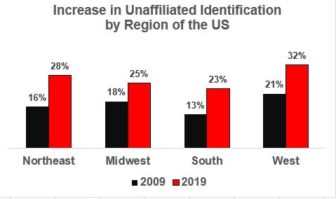TWH – The number of people calling themselves Christian has declined in the United States. This decline is expressed most strongly among Millennials, or those born between 1981 – 1996.
On October 17, 2019, The Pew Research Center released its report, “In U.S., Decline of Christianity Continues at Rapid Pace.” In 2009, 77% of adult U.S. respondents identified as Christian. In 2019, that percentage declined to 65%. This decline occurred almost entirely among Catholics and Protestants.
The trend is amid anecdotal reports that Druids, Heathens, Pagans, Wiccans, and Witches have become more visible; though the research did not address or sample these paths directly. Pew would have counted those Pagans paths under the catch-all label “Other Non-Christian.”
Nevertheless, in 2009, 17% of respondents identified as “atheist, agnostic or nothing in particular.” In 2019, 26% identified thus. The Pew Research Center has labeled this group rejecting all religious options as “The Unaffiliated.”
Decline in Christian belief and identity by generation
Millennials had the largest decline in the percentages of people calling themselves Christian. From 2009 to 2019, the percentage of Millennials calling themselves Christian plummeted by 16 points, dropping from 65% to 49%.
Among Catholics, the percentage declined from 23% to 14%. This decline has also occurred among Generation X, Baby Boomers, and the Silent Generation, but at lower rates. From 2009 to 2019, a smaller percentage of each generation has called themselves Christian.

Between 2009 and 2019, the percent of “Unaffiliated” Millennials increased from 27% to 40%. Among Millennials, Christians exceeded the “Unaffiliated” by only 9 percentage points.
From 2009 to 2019, the percentage of non-Christian Millennials increased from 7% to 9%. That increase occurred mainly in the category “Other non-Christian faiths” rather than among the larger categories of Judaism, Islam, Buddhism, and Hinduism. The larger non-Christian religions had relatively constant percentages ranging between 1% and 2% of US adults. Between 2009 and 2019, the “Other non-Christian faiths” category grew from 2% to 4% among Millennials.
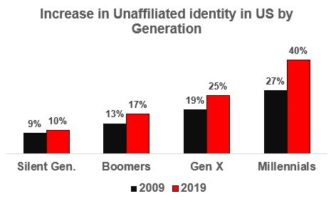
Decline in Christian belief broader than only generational
The Pew Forum reported data on three groups they defined as Blacks, Latinos, and Whites. Christian identity has decreased in all three groups.
In 2009 and 2019, a larger percentage of Blacks and Latinos called themselves Christian than did Whites. By 2019, the percentage of Blacks and Latinos calling themselves Christian had become smaller than that of Whites ten years before. In 2019, 72% of both Blacks and Latinos called themselves Christian. In 2009, however, 77% of percent of Whites did. The percentages of the “Unaffiliated” also increased in all three groups.
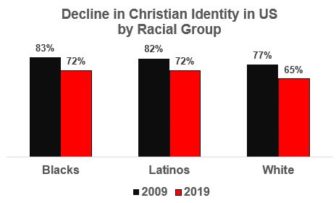
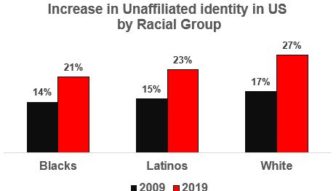
The Pew forum only reported data on two gender categories: men and women. Between 2009 and 2019, the percentage of men identifying as Christian went from 73% to 61%. In that same time period, the percentage of women identifying as Christian dropped from 80% to 69%.
From 2009 to 2019, the percentage of the “Unaffiliated” among the two reported genders grew by 10 percentage points. Among men, it grew to 30%, and among women to 23%.
Decline in Christian identification occurred in all regions of the US
The decline in Christianity occurred in all four regions of the U.S. In 2009 among all regions, the West had the lowest percentage, 69%, of people that called themselves Christian. By 2019, while the South reported the highest percentage of Christians (70%), the region still experienced a significant drop of 12% in those identifying as such.
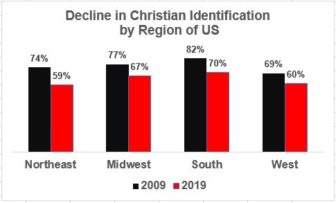
In 2009, the West had the highest percentage, 21%, of the “Unaffiliated.” By 2019, the South had a higher percentage, 23% of the “Unaffiliated” than the West had in 2009.
Decline of Christian identity and political parties
This decline occurred among Democrats and Republicans. Christian belief declined more among Democrats than among Republicans.
Christian belief among Democrats declined from 72% to 55%. A little over a third of Democrats, 34%, would now be considered “Unaffiliated.”
From 2009 to 2019, Christian belief among Republicans declined from 86% to 79%. Only 16% of Republicans would now be considered “Unaffiliated.”
In 2019, White Republicans had larger percentages of Christians than did Black or Latino Republicans. A higher percentage of White Republicans, 81%, reported Christian belief than did Black Republicans, 68%.
In contrast, 53% of White Democrats in 2019 identified as something other than Christian. Around three-quarters of Black and Latino Democrats identified as Christian.
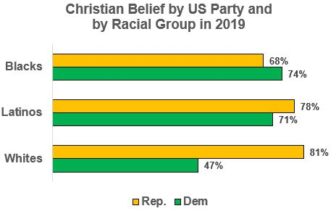
The report shows a decline in Christian identity among all major demographic groups in the U.S., despite Christians being a significant religious majority. This decline in Christian identity may result in greater visibility and acceptance of non-Christians minority faiths.
The Wild Hunt is not responsible for links to external content.
To join a conversation on this post:
Visit our The Wild Hunt subreddit! Point your favorite browser to https://www.reddit.com/r/The_Wild_Hunt_News/, then click “JOIN”. Make sure to click the bell, too, to be notified of new articles posted to our subreddit.
